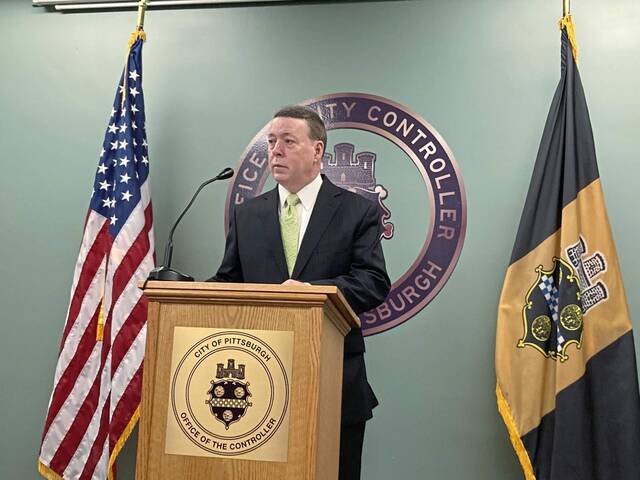Pittsburgh is in a stable financial condition following the covid-19 pandemic and its economic challenges, City Controller Michael Lamb said Friday in his annual report of the city’s finances.
The report showed the city ended last year with a surplus as revenues from various taxes increased.
About half of the city’s revenues come from real estate and earned income tax, Lamb said.
“We see growth in both of these revenue services, which bodes well for Pittsburgh moving forward,” he said.
The city’s earned income tax revenue has been increasing despite a challenging economy and a drop in the city’s population, he said. It’s increased nearly every year since 2013 — except for a slight dip from $109.8 million in 2019 to $108.3 million in 2020 — and brought in about $125.3 million last year, according to the report.
The city’s real estate tax generated about $155.4 million last year. That was up $3.2 million — or 2.3% — from 2021.
Pittsburgh also saw a rebound in amusement and parking tax revenue, which dropped significantly during the pandemic, Lamb said.
Revenues collected from the amusement tax grew from $10.1 million in 2021 to $17.5 million last year, which Lamb said is “pretty much back to where we were pre-pandemic.”
Money collected from the city’s parking tax remains down from pre-pandemic levels, but has been increasing, Lamb said. The parking tax generated about $53 million a year prior to covid-19. It brought in around $46 million last year.
The controller said the parking tax revenues may never get back to their pre-pandemic levels, as the culture of working in a Downtown office five days a week has changed dramatically.
“The pandemic not only changed city finances, it changed the culture of our city,” Lamb said. “It changed the way we work. It changed the way we commute.”
Still, Lamb said, the city is exceeding the $30 million in parking tax money needed to fund the city’s pension each year.
At the end of last year, the city had a fund balance, or reserves, of about $167.3 million.
“That’s mainly because of outperformance in a number of our taxes,” and the extra cash the city has received from the American Rescue Plan Act, Lamb said.
The city’s 2022 fund balance was 26% of the city’s expenditures last year, more than double the goal of 10%, Lamb said.
“We have weathered the worst of this storm,” he said. “We have come through the other side with still a very stable financial situation, in large part thanks to the American Rescue Plan and also our own resilient economy here in Pittsburgh.”
Lamb said last year was “a very challenging year in our markets and obviously a challenging year for our pension fund,” Lamb said. The pension’s invested portfolio dropped from about $700 million at the beginning of the year to about $630 million at year’s end. That doesn’t include the parking revenues.
“We are not dipping into the portfolio right now to pay pension benefits, so this fund will grow over time,” Lamb said.
The city borrowed $60 million in 2022 for capital projects, but the city’s total debt is still only at about 8.5% of the city’s spending. The city pays about $63 million a year in debt.
The financial report showed the city’s largest expenditure is public safety, which constitutes just over half of the city’s expenses.
Lamb said he had some concerns about the city’s progress in spending its American Rescue Plan Act funding. About $200 million is allocated for various projects — though that doesn’t mean it’s actually been spent — and about $130 million remains in the trust fund waiting to be allocated.
The funding needs to be spent by the end of 2026, according to federal guidelines.
“There’s still a lot of American Rescue Plan dollars out there that need to be put into service,” Lamb said.
The controller also called for the city’s tax-exempt nonprofits to start providing money to the city to help it improve its finances. Local officials have discussed the idea of a payments-in-lieu-of-taxes, or PILOT, program, in which nonprofits would voluntarily agree to pay a portion of what they would pay in taxes if not for their tax-exempt status. Mayor Ed Gainey recently launched a review process to challenge the tax-exempt status of properties that don’t truly act as purely public charities.
Lamb pushed for city leaders and nonprofits to begin negotiating a PILOT agreement.
“We continue to not have much revenue from our nonprofit sector,” he said.








